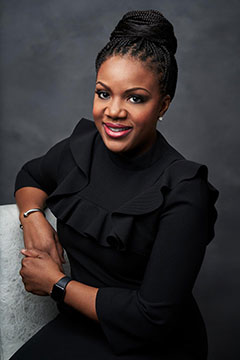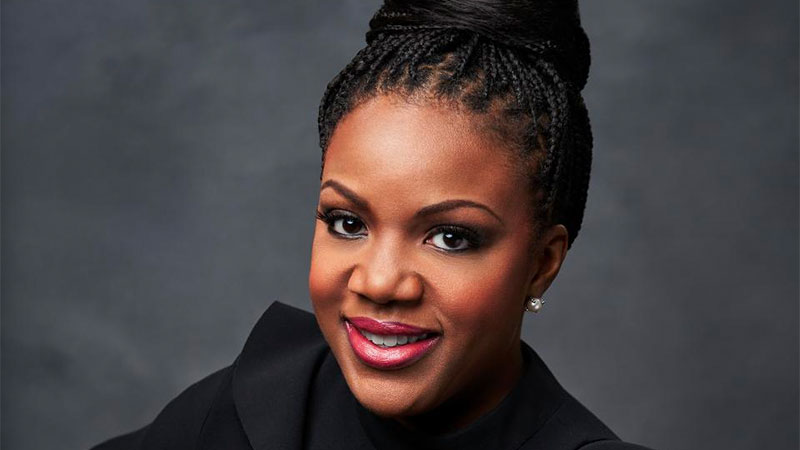By Pauleanna Reid, senior contributor at ForbesWomen
By the year 2025, the United States will need 60% of its working-age adults to have college degrees, workforce certificates or other quality credentials to meet social, economic, and individual demands. Today, when only 48% of adults in the U.S. reach educational achievement beyond high school, the need is clear for an all-new type of educational and training system that prioritizes today’s student – someone who is very likely to be a person of color, a first-generation college-goer, over the age of 25 and financially independent from their parents. Unfortunately, this person is also likely to be working at least a part-time job to live and pay for schooling in an age where the average tuition has increased 5x more than inflation over the past 35 years. A student working to complete a degree under such stressful conditions is not very likely to succeed, and studies have shown that if this individual does complete their degree program, it won’t be out of the ordinary for them to be saddled with significantly more debt (an average of $30k after earning a bachelor’s degree) than their white-counterparts, conversely leaving them with less stability for success post graduation. Haunted by these sobering truths of what the American Dream has become, many students are choosing to forgo their chance at pursuing postsecondary education for themselves while others just simply do not have access to the resources needed to complete the schooling at all.

Aggressively shining a light on these statistics is Lumina Foundation, a national nonprofit and research created to build a new system of learning and success. Leading Lumina’s efforts to mobilize and engage those influential entities with stakes in education and training after high school is Dr. Danette Howard, Ph.D., a woman who’s dedicated her life and career to shifting the conversations surrounding where to go to college and how to pay once we get there. As the SVP and chief strategy officer at Lumina Foundation, Dr. Howard hopes to break the cycle of student loan debt and non-completion amongst post-secondary students and daringly believes that education is the ticket to freedom that we all deserve to attain for ourselves.
A Practical Solution
“The system was not designed to support students who are ‘today’s students,’” Dr. Howard said, explaining the core focus of the work she does as we spoke during a recent interview. In our conversation, she eloquently described how today’s students who don’t tend to have the same economic or financial resources as other students and are over-represented as being African-American, often lack the unique help needed to complete training beyond high school and earn the appropriate credentials also necessary for attaining meaningful employment. Stating that these students are no less competent or capable, Dr. Howard shared how Lumina is removing the roadblocks (eg. eliminating remedial coursework from California State University policy), providing the proper support, and changing the system so that more individuals are able to complete the post-high school learning needed to get those college degrees and other credentials that will drastically change their lives and the world around them.
Working on multiple levels of the system – private, governmental, and nonprofit sectors – Lumina is bringing much-needed reform to the U.S. educational system and Dr. Howard is the remarkable visionary overseeing several of the foundation’s strategies aimed at increasing the number of adults who have postsecondary degrees, certificates, and credentials of value. Since joining Lumina, Dr. Howard has unveiled herself as a game-changer in postsecondary education as she brings a common sense approach to ultimately fixing the student debt crisis and creating a climate where no one can be kept from achieving higher education.
Having always had access to exceptional educational opportunities, Dr. Howard understood the value of her ability to pursue learning past what was expected. “My mom always encouraged my sister and I to get the best education that we could because that was something that no one would ever be able to take from us,” she recalled. Mentioning her mother’s words of having to work “twice as hard” because she was a black woman in a white-male dominated society, Dr. Howard looked right back to her mother for inspiration on how to do exactly that.
A Positive Outlook
“I was six months old when my mom went to college and I was in the third grade when she got her bachelor’s degree.” Dr. Howard spoke fondly of her mother’s educational journey. “Now I often ask her why she decided to go to college. She was the youngest of seven children, none of her brothers and sisters had ever gone to college, no one expected her to go to college,” she further explained. “She said that once my sister and I came along, she knew that in order for us to have a better life, she needed to do something to make sure she could have a better life for herself. So her making that monumental and very courageous decision had an incredible impact.”
Earning her bachelor’s degree with highest distinction from Howard University where she also serves on the board of trustees today, Dr. Howard saw firsthand the importance of support when engaged in higher learning. “HBCUs are one of the few places where young African-Americans are able to go to just fully and completely be themselves. To fully actualize their destiny, to see people in positions of leadership and power that look like them [and] that reflect to them what their own potential is…I don’t think we can underestimate the power in that.” Declaring her love and appreciation for the distinguished institutions that many people have begun to write off as redundant in this post-segregation era, Dr. Howard continued, “you have a place where for four years, students don’t ever have to ask, ‘Why is this happening to me? Because I’m a Black student?’ They can put that concern aside, only focus on their academics, only focus on realizing the fullness of their potential.”
With the help of this stable environment, Dr. Howard has ascended to her “dream job” at Lumina where she has a hand in ensuring that all people living in the U.S. have access to the same opportunities she’s had. “As I just heard a colleague say the other day, ‘students need to know that they have one person.’” She emphasized. “One person at the institution that’s going to be their person that they can go to for support, mentoring, etc. All of that contributes to a student’s ability to be successful academically and to complete those credentials that they want to get and that we need for them to receive.”
With the onset of the pandemic, many students were burdened with e-learning environments barely anyone was prepared for, startling unemployment rates, food insecurities, and a coronavirus relief package passed to give six-month reprieve to only a subset of borrowers already dealing with a decades-long debt crisis. Having a great deal of their security eradicated, many students may not finish the academic year and will fail to attain their distinctions, possibly leaving them worse off than when they started, especially if they’ve taken on significant amounts of debt to attend. However, Dr. Howard remains assured of Lumina’s aspirations of postsecondary education for all. “There are a lot of other needs that students have that aren’t specifically focused on the academic curriculum, but certainly impact their ability,” mentioned Dr. Howard. “If we look at postsecondary education as a real solution to some of these issues, then the funding for these opportunities will be made more readily available,” she concluded.
This article originally appeared in Forbes.
